
Musical History
by Sybille Forster-Rentmeister
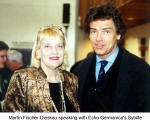 In
early March music history was made in Kitchener-Waterloo. Michael Duschenes,
Executive Director of the Kitchener-Waterloo Symphony introduced the major
players of the new season under the baton of Principal Conductor Martin
Fischer-Dieskau. Great things can be expected in the coming season on all
fronts, the entertaining and the educational one.
In
early March music history was made in Kitchener-Waterloo. Michael Duschenes,
Executive Director of the Kitchener-Waterloo Symphony introduced the major
players of the new season under the baton of Principal Conductor Martin
Fischer-Dieskau. Great things can be expected in the coming season on all
fronts, the entertaining and the educational one.
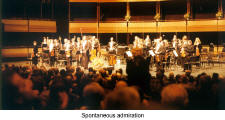 And
great things occurred that very same night, when Dietrich Fischer-Dieskau
conducted the first Masterpiece Concert in the Raffi Armenian Theatre in the
Centre in the Square. The local paper "The Record" gushed in superlatives,
comparing him to all the great conductors before him on the concert stages
of the world, mentioning the "serenity of Furtwängler, Previn, Stokowsky and
Karajan". The first three I only know from film clips as available, but
Karajan was a familiar sight and known to be everything and anything, but
never serene. The expression "Circus Karajani" did not occur by accident.
But Fischer-Dieskau and Karajan do have something in common, namely their
passion for the music and a strong desire to make it come alive as honestly
as possible.
And
great things occurred that very same night, when Dietrich Fischer-Dieskau
conducted the first Masterpiece Concert in the Raffi Armenian Theatre in the
Centre in the Square. The local paper "The Record" gushed in superlatives,
comparing him to all the great conductors before him on the concert stages
of the world, mentioning the "serenity of Furtwängler, Previn, Stokowsky and
Karajan". The first three I only know from film clips as available, but
Karajan was a familiar sight and known to be everything and anything, but
never serene. The expression "Circus Karajani" did not occur by accident.
But Fischer-Dieskau and Karajan do have something in common, namely their
passion for the music and a strong desire to make it come alive as honestly
as possible.
In the opening Violin Concerto in D, op.61 by Ludwig van Beethoven (1770-1827) he demonstrated such an extraordinary ability to duplicate, to understand the composer’s intention, that it possibly was the cleanest version of this concert ever performed. Devoid of baroque arabesques and unnecessary emotional frills the movements flowed from the stage crisp and elegant.
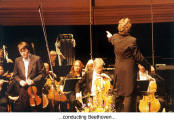 Stephan
Sitarski, the violin soloist and also concertmaster of this and other
symphonic orchestras, mentioned already at the earlier press conference that
he and Fischer-Dieskau saw totally eye to eye on this concert and how music
should be performed in general. He was excited about their work together.
This agreement showed at night with every stroke of his bow, with every
phrase delivered with certainty and clarity, never loosing any of the
intricacies of the natural complexities. This was Beethoven pure, able to
uplift effortlessly, or heighten an already existing exultation. The
well-deserved standing ovation validated the excellent togetherness of
conductor, soloist and orchestra.
Stephan
Sitarski, the violin soloist and also concertmaster of this and other
symphonic orchestras, mentioned already at the earlier press conference that
he and Fischer-Dieskau saw totally eye to eye on this concert and how music
should be performed in general. He was excited about their work together.
This agreement showed at night with every stroke of his bow, with every
phrase delivered with certainty and clarity, never loosing any of the
intricacies of the natural complexities. This was Beethoven pure, able to
uplift effortlessly, or heighten an already existing exultation. The
well-deserved standing ovation validated the excellent togetherness of
conductor, soloist and orchestra.
Local Waterloo composer Peter Hatch appeared after the Beethoven concerto to explain his Reveiller, which he wrote in the Fall of 2000. As a wakeup call for nature as well as for military forces it showed considerable insight and interesting nuances in these paralleling universes. As in the violin concerto Fischer-Dieskau understood it perfectly to accentuate without overpowering, to lead without dictating. The emotional impact was not lost on the audience, which was already familiar with the piece and thoroughly enjoyed it.
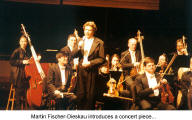 The
last part of the evening was taken up with excerpts from Richard Wagner’s
operas, making a dream come true for Raffi Armenian, who always wanted to
transform the concert hall into a perfect venue for Wagner performances.
Wagner is known to be an ingenious engineer of musical theatrical works,
where all contributing factors have to have equal weight and be balanced to
create the desired emotional effect. A full orchestra worked extremely hard,
as did the conductor, to bring home the required thrill inherent in excerpts
from the ring cycle. The five chosen pieces were in themselves like a
synopsis of the whole cycle with a beginning, Ride of the Valkyries, a
middle, Forrest Murmurs-Siegfried, just before he kills the dragon, then his
Rhine Journey, and then his Funeral March, and an end with the Entry of the
Gods into Valhalla. Someone unfamiliar with the whole concept might miss the
completeness a balanced visual performance with costumes and lights and
scenery can offer, and perhaps miss a nuance in an abbreviated concert
version of such vast drama. But it was nevertheless a most brilliant and
wild ride through some of Wagner’s most admirable scores.
The
last part of the evening was taken up with excerpts from Richard Wagner’s
operas, making a dream come true for Raffi Armenian, who always wanted to
transform the concert hall into a perfect venue for Wagner performances.
Wagner is known to be an ingenious engineer of musical theatrical works,
where all contributing factors have to have equal weight and be balanced to
create the desired emotional effect. A full orchestra worked extremely hard,
as did the conductor, to bring home the required thrill inherent in excerpts
from the ring cycle. The five chosen pieces were in themselves like a
synopsis of the whole cycle with a beginning, Ride of the Valkyries, a
middle, Forrest Murmurs-Siegfried, just before he kills the dragon, then his
Rhine Journey, and then his Funeral March, and an end with the Entry of the
Gods into Valhalla. Someone unfamiliar with the whole concept might miss the
completeness a balanced visual performance with costumes and lights and
scenery can offer, and perhaps miss a nuance in an abbreviated concert
version of such vast drama. But it was nevertheless a most brilliant and
wild ride through some of Wagner’s most admirable scores.
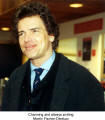 Martin
Fischer-Dieskau had lost nothing of his charm or confidence after this tour
de force performance. He congratulated his orchestra and the various
sections repeatedly and took his bows with them several times. It was only
due to exhaustion of the applauding public that he was not called out more
often. Hardly ever have so many people let performers know so loudly and so
vigorously that they liked what they heard. For a while conservative
Kitchener felt like a hot European location. No doubt the upcoming season
will be well received and Beethoven’s Ninth Symphony with local choirs,
perhaps even the Concordia Choir (?), will be a full success.
Martin
Fischer-Dieskau had lost nothing of his charm or confidence after this tour
de force performance. He congratulated his orchestra and the various
sections repeatedly and took his bows with them several times. It was only
due to exhaustion of the applauding public that he was not called out more
often. Hardly ever have so many people let performers know so loudly and so
vigorously that they liked what they heard. For a while conservative
Kitchener felt like a hot European location. No doubt the upcoming season
will be well received and Beethoven’s Ninth Symphony with local choirs,
perhaps even the Concordia Choir (?), will be a full success.
The concert was also sponsored by Klaus Woerner, president
and CEO of ATS Automation Tooling Systems Inc and his wife Anna. To keep
yourself availed of all upcoming events contact the box office at
519-578-1570.
Baroque Simplified
By now nearly all music lovers know that the best Baroque orchestra hails from Toronto and has the name Tafelmusik. Wherever this ensemble performs on original instruments it meets with much enthusiasm for its freshness and uncomplicated approach to some of the most complicated and ornamental music ever composed. No wonder then that noted conductors and music historians who revel like Tafelmusik in baroque music love to enter into engaging productions with this enterprising orchestra. Whether it is Duisburg’s Bruno Weil or Andrew Parrot from England, they all love to conduct Tafelmusik. Music historian and conductor Parrot is especially famous for researching the music of Bach and his intentions in regards to the vocal force that is required to sing the concerted church music of Bach. He came to the conclusion that only single soloists must have been Bach’s intention and promptly started to present works of Bach that way.
Recently, during the Easter week, Tafelmusik presented Andrew Parrot as conductor of Bach’s St. Matthew Passion in Toronto’s Trinity-St.Paul United Church. Exploring his music more thoroughly in its most essential medium is a worthy task indeed, especially some 250 years after the composers death. Taflemusik’s Musik Director Jeanne Lamont was very excited when she first announced this project of the St. Matthew Passion. "The scoring for two orchestras, complete with all the vocal work, including the choruses, one soloist per part, will be thrilling for musicians and audience alike" she prophesied when introducing the new season last year.
 And
she was totally correct in her estimation. Bringing back Wilfried Jochens as
the Evangelist was another little coup that worked out extremely well. We
met with Mr. Jochens and discovered why he is the ideal Evangelist. He has
sung this part for 30 years again and again and has weathered many different
music trends. What keeps it exciting is the fact that with those trends the
interpretation changes, stays fresh and new.
And
she was totally correct in her estimation. Bringing back Wilfried Jochens as
the Evangelist was another little coup that worked out extremely well. We
met with Mr. Jochens and discovered why he is the ideal Evangelist. He has
sung this part for 30 years again and again and has weathered many different
music trends. What keeps it exciting is the fact that with those trends the
interpretation changes, stays fresh and new.
Wilfried Jochens chose to be a concert singer rather than an opera singer. He loved especially church music since his boyhood choir days. As a young man he married, had a family and that too dictated what was practical in way of a career. Being a half-a-professor at university, teaching what he loves for 20 years now, leaves him time for concert tours like the one to Toronto. He frequently sings in the Benelux countries and in Spain, all of which have a rich tradition in sacred music. He observed that in countries like Germany churches are not as well visited anymore, but people will come to a concert as "Ersatz" for other services, it seems. Through the decades he observed many changes in the way this kind of music has experienced. There were times of extremely rich symphonic sounds and now there has been a return to more purist forms. But a style not too academic and stiff is probably the best, he felt.
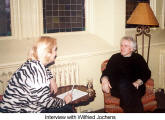 Our
conversation was brief; he had to go and join the rehearsal, but left us
with much anticipation for opening night.
Our
conversation was brief; he had to go and join the rehearsal, but left us
with much anticipation for opening night.
On opening night the audience was in for a long haul. Over three hours of Bach, even at his finest, can be a bit strenuous, not only for the performers. Even though there were translations on monitors of this German version of the Passion, it did not help much with the over-length of the piece. For those with enough knowledge of the German language it was a much more pleasant experience. An appreciation for fine diction made up for lengthy passages that lacked impact.
The voices of the soloists were well matched. Wilfried Jochens as Evangelist found the spark to light his passion for the rather narrative subscription for his part by the conductor. Jesus was also sung by a German singer, bass baritone Christian Hilz, who delivered a rich pallet of sincere and believable sounds. Similarly well suited for his part was a young Canadian counter tenor, Matthew White. And when all soloists sang together and a choral sound abounded the academic experiment of truly original music became more enjoyable for the broader audience.
It was fortunate that the performance space is not huge and thus a certain intimacy was established between audience and performers. But a choral version would have been preferred by most of the people present.We liked it because we could follow details in German others might miss, or which would even be lost in a choral version. It reminded us also of an austere style of Protestantism, which we were familiar with. Despite some of the difficulties in presenting such a demanding work and the darkness of the subject it is this kind of reaching beyond borders with cooperative projects that unify a weary world audience at a time when it needs it most.
